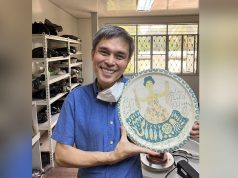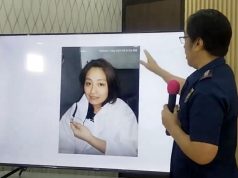MANILA – Saying “my persecutors cannot even properly fabricate charges against me,” Sen. Leila de Lima on Thursday turned the tables on the Department of Justice for rushing to have her detained on a nonbailable case of drug trading, and then saying the charges will be corrected to conspiracy to commit drug trading. The latter charge would supposedly skirt the requirement of having to show in court the physical evidence or the drugs in question.
“That’s enough to show that there was, as I have been saying all along, a glaringly clear, single-minded, over-eagerness to indict me for a crime I didn’t commit,” the senator said in a statement from her detention cell at the PNP Custodial Center in Campo Crame, where she has been kept for more than 200 days.
Last week, she suffered a setback when the Supreme Court voted 9-6 to uphold the jurisdiction of a Muntinlupa regional trial court over the charges filed against her by the Department of Justice. Her successor and nemesis, Justice Secretary Vitaliano Aguirre III, had alleged she abetted the prison drug trade at the New Bilibid Prisons when she was heading the DOJ during the Aquino administration.
He had trotted out several drug convicts in congressional hearings where they claimed she had given orders as then DOJ chief for the influential drug traffickers to raise money for her senatorial campaign, and subsequently used their testimonies in non-bailable charges filed against her.
OSG’s advice: amend raps
Soon after the 9-6 SC vote that dealt her case a major blow, however, the DOJ publicly admitted plans to amend the charges against her: from drug trading – which would require presentation of the corpus delicti or the body of the crime, in this case, the drugs – to “conspiracy” to commit drug trading.
According to Aguirre, it was the Office of the Solicitor General that advised amending the charges.
De Lima, who has been detained in Crame Crame since her arrest on Feb. 24, was indicted for violation of Section 5 of the Dangerous Drugs Act in relation to Section 3(jj), Section 26(b) and Section 28.
Section 3(jj) refers to trading of illegal drugs while Section 28 covers the criminal liability of public officials involved in the proliferation of narcotics.
Aguirre said recently the DOJ panel of prosecutors is considering the position raised by Solicitor General Jose Calida during oral arguments on De Lima’s petition in the Supreme Court, which sought the junking of the criminal complaint lodged against her.
Calida had told magistrates that De Lima should have been charged with violation of Section 26 of Republic Act No. 9165, or the Comprehensive Dangerous Drugs Act of 2002, instead of violation of Section 5 of the said law.
“Ang discussion ni SolGen Calida. Instead of Section 5, it would be Sec. 26. (SolGen Calida’s discussion was that instead of Section 5, it would be Sec. 26.) So it would mean an amendment from Sec. 26 in relation to Sec. 5. Legal naman, actually nasabi ni SolGen Calida na sa Supreme Court na wala naman nakitaan ng mali ng SC (It is legal, actually SolGen Calida said the Supreme Court saw nothing wrong with it),” Aguirre said.
Section 26 pertains to “any attempt or conspiracy” to import, sell, trade, administer, dispense, deliver, distribute and transport illegal drugs, and maintain a drug den, produce narcotics and cultivate sources of illicit substances.
On the other hand, Section 5 prohibits the “sale, trading, administration, dispensation, delivery, distribution and transportation of dangerous drugs and/or controlled precursors and essential chemicals.”
Reacting to reports of such change of tack by the government, de Lima said Thursday: “It is ironic that, on paper, it looks like I lost my case before the Supreme Court. In truth, however, because of my petition, my persecutors have now implicitly admitted that they have no evidence to charge me. This is the one and only glaring fact that should be evident after Secretary Aguirre revealed that DOJ prosecutors are thinking of changing their story as to my alleged involvement in the illegal drug trade.”
The absence of physical evidence, crucial to a drug trading case, was, de Lima recalled, “made painfully and starkly obvious during the oral arguments before the Supreme Court last March. Back then, I, through my lawyers confronted my persecutors with the fact that there was no allegation, much less proof, of the corpus delicti of the offense of illegal drug trading that I was being charged with.”
Where are the drugs? My ‘millions’? – De Lima
The senator continued: “No drugs, no proof of the sale thereof. Nothing. Not even proof of the alleged billions of pesos I allegedly received; not even after Aguirre announced in public that I allegedly had hundreds of millions of pesos in banks; and certainly not after he attempted – and failed – to force former employees to falsely testify against me.”
In response, the senator pointed out, “the OSG skirted the utter lack of evidence against me and, instead, forwarded a completely different theory from that of the DOJ Prosecutors, who, in the estimation of the OSG, are apparently so incompetent that they can’t even figure out what crime they were actually supposed to charge me with in the first place.”
She quoted the OSG as saying there is “no need to present evidence of the crime of illegal trading because I wasn’t supposed to be charged for that offense anyway, but merely for conspiring with others to commit it. In their mind, that’s enough to explain why they cannot even present a single evidence of the crime. ”
What that theory “sufficiently and unequivocally shows is that my persecutors cannot even properly fabricate charges against me. That’s enough to show that there was, as I have been saying all along, a glaringly clear, single-minded, over-eagerness to indict me for a crime I didn’t commit,” stressed de Lima.
“Most disturbingly, however, is that they want the courts and the people to believe that a person could be forced to undergo the rigors, expense and anxiety of trial, and be placed in jeopardy of losing their liberty and be adjudged guilty, based solely on the perjured say-so of mostly convicted felons who have been coerced, pressured or otherwise unduly influenced to give false testimonies. In the vernacular, to put a person in jail these days for the non-bailable offense of drug trafficking, laway lang pala ang puhunan [only saliva is needed as capital].
“There is something terribly, terribly wrong and frightening with that prospect,” said the senator.










